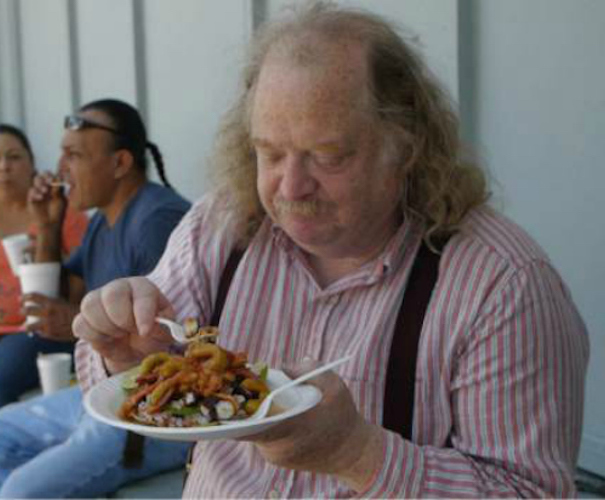Film Review: Foodie Documentary “City of Gold” — Plain Fare
The really unforgivable thing about City of Gold: the dull, flat way in which the food is shown.
City of Gold, directed by Laura Gabbert. At the Kendall Square Cinema, Cambridge, MA

“LA Times” food critic Jonathan Gold chowing down in the documentary “City of Gold.”
By Gerald Peary
Food reviewing in America used to be about reviewing fancy restaurants. Period. I remember a breakthrough day in The New York Times, probably in the 1970s. The Times critic, Mimi Sheraton, supplied a list of her ten best meals of the year. And at number two was a Mexican food stand in Chicago, where Sheraton had experienced hot buttered corn anointed in fresh lime juice and lathered in red-pepper hot sauce. And then, of course, there was the great Calvin Trillin with his culinary Bibles, American Fried (1974) and Alice, Let’s Eat (1978), obsessive love essays to Kansas City barbecue and other tasty, down-home regional cookings. And so funny!
Jonathan Gold, the Pulitzer Prize-winning food critic for the LA Times and the subject of Laura Gabbert’s documentary, City of Gold, swears by Trillin and readily admits, in his earlier LA Weekly days, that he used to try to write like Trillin. Clearly, he’s on a Trillin-like quest in his home city of LA, driving about in his Dodge truck to shopping malls, city markets, ghetto streets, ethnic neighborhoods, in search of transcendent food. The more obscure and hidden the restaurant, the better for discovery in his popular newspaper column.
Like most food critics, Gold makes reservations under phony names. But he admits he’s hard to disguise once he gets to the restaurant. Everyone in the food business in LA knows what he looks like: the fat, balding Jewish guy with hair to his shoulders, a scruffy mustache, and the inevitable suspenders around his bowling-ball belly. He’s friends with chefs and restaurant workers, possibly a conflict of interest. But Gold is readily forgiven, because of his extraordinary knowledge of food from so many countries, perhaps Korean and Mexican cuisine above all. And because he takes his job so seriously, eating at a restaurant he’s reviewing five times on the average. He might not like the food immediately, but he has to understand and have swallowed it down often before he’s ready to write. He has no trouble at all with fried grasshoppers in Koreatown. But Gold takes a while with hagfish, a slimy, elongated, spineless thing, which he describes as “Not really delicious. Eel but a little worse.”
His daily favorite food? Tacos, and he knows where to get them just right at plenty of Mexican haunts. He writes of one place in which the shrimp in the taco is smothered in “glossy black” mole sauce, “spicy as a novella, as bitter as tears.” Yum! How did this classically trained cellist learn so darned much about locally produced food? When he was a bored UCLA undergraduate, he gave himself an insane task: to eat at every single restaurant along Pico Boulevard, all 15.5 miles of it. Apparently, he made it, chewing his way through Salvadorean neighborhoods to end at Tom’s No. 5 on the beach at Santa Monica, chowing down at the finish line Tom’s heavenly chili fries.
Can there be a more perfect subject for a documentary than hanging out with Jonathan Gold as he goes out in LA in pursuit of delicious food? City of Gold botches the assignment. It’s badly organized, filled with arbitrary shots of Los Angeles, used arbitrarily. Filmmaker Gabbert isn’t a particularily skilled interviewer, and Gold slides by saying only mildly interesting things. He’s clearly far more deep and complex than the cursory portrait we have of him. You feel that Gabbert admires him far too much to ask any probing questions.
And why didn’t Gabbert venture with Gold to a Jewish delicatessen? Gold explains how he with his family, reformed Jews, had many a meal dining out at a deli called Junior’s. Obviously, that was a formative experience in developing Gold’s ethnic-food palate, and deserves at-the-table exploring.
But the really unforgivable thing about City of Gold: the dull, flat way in which the food is shown. The filmmaker, Gabbert, must not be a foodie! This should be a documentary in which you feel pain wanting to jump into the frame and eat, eat, eat. There was little salivating on my part, even though what Gold craves at restaurants is exactly the kind of anti-Yuppie victuals I champion. Only once watching City of Gold was I really envious and in awe of the cuisine on the big screen: that was when Jonathan Gold feasted — and I do mean feasted! — on what seemed the world’s finest hot dog on a bun.
Gerald Peary is a professor at Suffolk University, Boston, curator of the Boston University Cinematheque, and the general editor of the “Conversations with Filmmakers” series from the University Press of Mississippi. A critic for the late Boston Phoenix, he is the author of nine books on cinema, writer-director of the documentaries For the Love of Movies: the Story of American Film Criticism and Archie’s Betty, and a featured actor in the 2013 independent narrative Computer Chess.
Tagged: City of Gold, Jonathan Gold, LATimes, documentary, food criticism, foodie

